Suicide
An Ounce of Engagement: The Key to Reducing Military Suicide
Can military suicide be avoided with a better transition into civilian life?
Posted March 26, 2014
Andy Nguyen with supporters Ashlee Hunt Kleinert and Michael Marr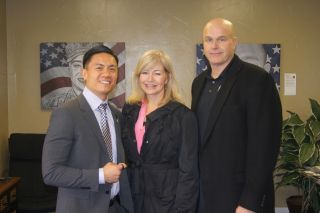

Andy Nguyen with supporters Ashlee Hunt Kleinert and Michael Marr
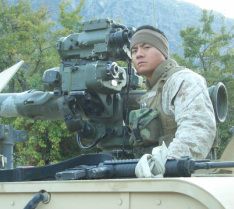
Andy Nguyen
Nguyen, a Marine veteran trained as a TOW Missile Gunner, Black Belt MCMAP Instructor, Helicopter Rope Suspension Training Master, and Combat Marksmanship Instructor fused his military know-how with the GI bill to incubate himself into the birth of 03Entrepreneur, a digital marketing and web development firm. Nguyen launched into civilian life when many veterans can easily stall. His formula for success cuts to the mark with the precision of a combat instructor: education, mentorship, and deep connection to community.
Not always this directed, Andy barely finished high school. He started a car racing business with unbridled energy but no concept of business practice. Overspending left that business belly up. In 2000, he enrolled in community college to obtain the skills he lacked to start another business. “9-11 happened and that changed everything,” Nguyen’s square jaw tightened. “I joined the Marines.”
After serving four years active duty with a seven month tour in Afghanistan, Andy exited the Marines in 2006. Back then, the military relied upon the Transition Assistance Program (TAP), a one-week curriculum, to help veterans adjust to civilian life. Andy felt that TAP simply taught veterans how to collect unemployment, file for disability, and apply for more money for PTSD. With easy access to medication for pain and PTSD, Nguyen watched too many veterans become overmedicated and be provided with enough pay to live comfortably and demotivate their job search. Nguyen is the first to say that this program has changed names and is undoubtedly improved since his exit from the military. The idea that veterans need a long period of rest to overcome wartime experience, however, still persists.
Rest becomes a quick route to isolation according to Nguyen. Andy sees the GI bill as the prime veteran catalyst to a purposeful civilian life. Vets sometimes see school as what happens when they can’t get a job, an admission of failure. Andy wants to change that perception. The GI bill is the key to unlock the skills learned in the military, plus it’s fun. “The government was paying me to better myself and surround myself with pretty girls,” he said. "Sounded like a good deal to me.” As for the need for rest, Andy had a quick answer. “Do Harvard MBAs rest after business school?” Nguyen eyes sparked. “No.“ Inaction leads to atrophy which spawns apathy and isolation.
Nguyen credits David Omholt’s mentorship as the rudder that kept him on track after his return from Afghanistan. Omholt, CEO of The Entrepreneur Authority, encouraged Nguyen as he obtained his undergraduate degree from UNT, a Masters in Entrepreneurship from SMU, and a certificate program from MIT. When Nguyen initiated 03Entrepreneur, Omholt cheered him on. Originally founded in 2008 as WSI Search, during one of the worst economic periods in the last three decades, WSI recently merged with a software development company to become 03Entrepreneur (03E) and now has over 50 employees. Not bad for an almost high school drop out.
With his business prospering, Nguyen could have rested, but he’s not that kind of guy. A turning point event occurred that spawned an idea, much like 9-11. When Nguyen watched the number of veterans who died by suicide exceed the number killed in combat, he had to act. From his own experience, he felt the current transition programs were too short and too focused on the poor economy to allow for smooth integration. With only the support from TAP, “Taps” played at too many veteran funerals.
Andy analyzed similarities between his life and the lives of other vets who transitioned well into civilian life. That’s when he developed his formula: education, mentorship, and community. He founded Honor, Courage and Commitment (HCC), a non-profit that blends military skill with education and mentorship to birth blue chip contributors to the US economy. HCC offers office space, assistance in resume writing, business training and a connection to mentors in the business community. Currently 18 businesses are under development, serving close to 100 veterans.
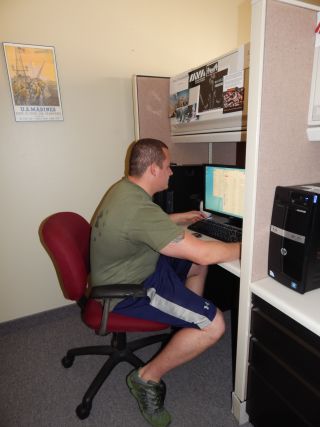
Aaron Throckmorton incubates on his crossfit non-profit Agoge Challenge
HCC also demands that veterans continue to serve their community after military service. Community service is a critical ingredient in the formula. HCC volunteers have often been first on the scene for natural disaster relief and the rebuilding that comes after them. They help others, but there’s an intangible benefit to these men and women naturally inclined to serve. It builds a familiar setting to meet others already entrenched in civilian life. Veterans are used to doing, completing missions, not bragging about themselves. A typical interview situation often grates against their trained approach of teamwork and unprompted action. Nguyen smiles and shakes his head. “Holding a paintbrush and talking to someone is a hell of a lot easier for most vets than an interview.”
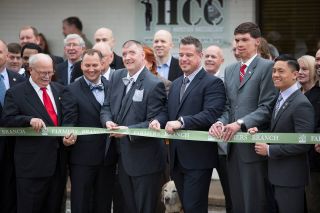
HCC Staff and supports open the first Texas business incubator
As I listened to the mission of HCC, I was reminded of a TED talk by Thomas Insel, Director of the National Institute of Mental Health about the poor progress with reducing mortality related to mental illness. Insel compares the progress in reducing mortality made with heart disease, AIDS and other highly fatal illnesses with the flat line of mental illness. Insel makes the point that mental illness, like most diseases, could be controlled if we catch it early and refuse to allow the disease to incubate. I think he’s right, but we need to take a step further. What if we take action before mental illness even has a chance to start?
In my experience, depression always hit hardest at major points of transition: freshman year of college, loss of identity when kids started school, abandonment of a book I’d worked on for eight years. Sure there’s genetic predisposition, but genetics often need a catalyst to wander into the mortality zone. Smoking, lack of exercise, and poor diet spur the escalation of heart disease. Everybody knows that.
Yet somehow we fail to link life habits to brain issues. I’m now wary of transition points in my life. For me, left unsupervised, they can become catalysts for my depression. I don’t think I’m alone. To protect myself, I build in support before and around those transition points. If I understood this earlier in life, could I have avoided a severe depression that almost took my life? My bet is yes. Depression thrives in the incubator of isolation.
HCC is getting to vets before they have a chance to isolate. Nguyen, a son of Vietnamese immigrants who built their lives from nothing, self-acclaimed grunt, veteran, entrepreneur, now philanthropist wears a simple black ring on his right index finger. “It’s the silent salute.” Some veterans wear their pain in physical scars, some emotionally, some with their lives. The black ring honors all of them, earned by a small fee and 22 push-ups to honor the veterans who die each day by suicide.
When Andy offered me my own black ring, I dropped to the ground gave him 22. So if you find this strange video of a woman in a 60s style dress and black boots doing push ups on the HCC Facebook page, you’ll know it’s me. As a civilian, I’ll wear my black ring, hoping to make a new fashion statement. Together, we can help change the trend of veteran transition from SNAFU to a engaged civilian life with purpose, laughter, and friendship. HCC and Andy Nguyen are ahead of the curve with this new twist on an old adage. An ounce of engagement, early enough, consistently enough, can save lives. Semper Fi!
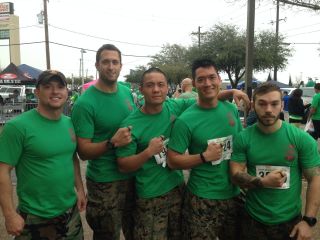
UPDATE: We have issued a challenge with Honor Courage Commitment to have anyone post a video on the Honor Courage Commitment facebook page by Friday 4/4/14 with the tag "#22Kill to honor those who serve(d)". Our partners have pledged with us $100 for every person in a video up to $100,000! Take our challenge and post your video today!! We have posted some of our favorites on the Hersh Foundation facebook page, as well.
For more information about Julie K Hersh, go to the Struck by Living Website or follow Struck by Living on Facebook.
Check out Honor Courage and Commitment on Facebook.
Check out Agoge Challenge to help Aaron Throckmorton with his crossfit challenge




